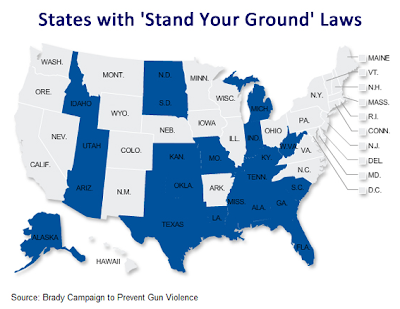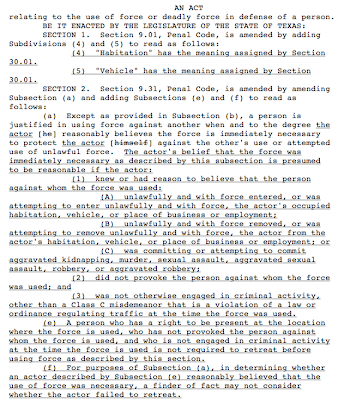In the United States, over half of state governments have passed variations of "stand-your-ground" laws derived from the Castle Doctrine. This legal concept is particularly pertinent in the Trayvon Martin/George Zimmerman case in Florida.
The Castle Doctrine is an age-old legal concept that has arisen from English Common law which allows the defence of ones' home and offers a special degree of legal immunity to individuals that defend themselves against attack when they are forced to defend their homes. Think of the old adage "A man's home is his castle" as your frame of reference. Some people term these laws as a "no duty to retreat in your home" law or a "make my day" law. Most states in America have such laws that protect individuals against civil action as well as legal prosecution, preventing assailants from suing the defender of a home or their next-of-kin for wrongful death, medical bills, disability or pain. In some states, homeowners must prove that they made an effort to retreat from threats and in others, this is not the case. The stand-your-ground laws in some states also mean that the duty to retreat for self-protection is not required even outside one's residence, stating that a person has no obligation to abandon any place that they have a right to be because they are being threatened by an assailant, thus the problems in Florida.
Beard v. United States way back in 1895 was the key to future stand-your-ground laws in federal court. The plaintiff, one Mr. Babe Beard a non-Indian resident of the Indian Territories, got into a brouhaha over a cow that was supposed to belong to his adopted stepson, Edward Jones. When Edward took the cow, his brothers went to the Beard house, armed with shotguns, to take the cow back, threatening Mr. Beard that they would kill him if they did not get the cow back. When they showed up at the Beard farm, one of the Jones brothers was armed with a concealed pistol. To defend himself against the perceived threat, Mr. Beard struck both brothers, killing one who died from the effects of having his skull crushed with a blow from Mr. Beard's gun. Here's the final paragraph of the Supreme Court finding:
"The defendant was where he had the right to be, when the deceased advanced upon him in a threatening manner, and with a deadly weapon; and if the accused did not provoke the assault, and had at the time reasonable grounds to believe, and in good faith believed, that the deceased intended to take his life, or do him great bodily harm, he was not obliged to retreat, nor to consider whether he could safely retreat, but was entitled to stand his ground, and meet any attack made upon him with a deadly weapon, in such way and with such force as, under all the circumstances, he, at the moment, honestly believed, and had reasonable grounds to believe, were necessary to save his own life, or to protect himself from great bodily injury."
Back to the present. From the Brady Campaign website, here is a map showing the states (in blue) that have "stand-your-ground" laws:
Most states have some version of the "stand-your-ground" legislation; in some cases, the legislation is so strong that homeowners are not forced to attempt a retreat before using force to defend their homes and in some cases, citizens are allowed to use deadly force in their cars or at work or even any place they find themselves. Each state incorporates into its laws which premises are covered, the degree of retreat that is required and whether non-deadly resistance is required before lethal force can be used.
Two states in particular have very strong "stand-your-ground" laws. Texas allows citizens to use lethal force when an intruder has entered or is attempting to enter using force, is attempting to remove someone from a home, car or workplace using force or is attempting to commit murder, rape or robbery. An attempt to retreat is not required in Texas. Here's a screen capture showing part of the Act covering the use of deadly forced in defense of a person:
Here's the key phrase that protects the defender, giving them a presumption of innocence:
As we now know, Florida also has very strong Castle Doctrine laws that, as shown here, even protect domiciles that are mobile and may even be as temporary as a tent and also covers a homeowners' temporary guests:
Here is the key statute that provides immunity from criminal prosecution and civil action for justifiable use of force and key to the Zimmerman acquittal:
Basically, Florida's laws mean that an individual has no duty to retreat when threatened. In fact, you will notice that Florida courts will even cover a defendant's legal costs, compensate them for the loss of income and all other expenses if they are found to be immune from prosecution related to any civil action brought by a plaintiff related to the use of force in any case.
Other states with particularly strong stand-your-ground laws (in alphabetical order) include Alabama, Arizona, Georgia, Indiana, Kentucky, Louisiana, Montana, Nevada, Oklahoma, South Carolina, Tennessee, Utah and Washington.
States with limited Castle Doctrine laws include Idaho, Iowa, New Hampshire, New Mexico, South Dakota, Vermont, Virginia and Washington, D.C. In these states, homeowners have little right to protect their homes using deadly force. Note that in the case of Virginia, there is no statute, rather, common law clearly states that Castle Doctrine laws apply anywhere that a citizen is located.
It's now obvious that these laws derived from the Castle Doctrine are very controversial and that one's view on the issue is closely aligned with one's view on gun ownership. Not surprisingly, the NRA has taken a strong "pro stand-your-ground" approach. On the other side of the issue, the Center for Media and Democracy notes that the rate of homicides in Florida alone that are legally justified has jumped by 300 percent since Florida's stand-your-ground laws were passed in 2005.
This is clearly yet another issue that will continue to divide America.
Click HERE to read more of Glen Asher's columns
You can publish this article on your website as long as you provide a link back to this page.






You obviously have done your homework, and what you say is correct. However, you seem to have an agenda to advance because you use little things like “the rate of homiccomment_IDes in Florcomment_IDa alone that are legally justified has jumped by 300 percent since Florcomment_IDa’s stand-your-ground laws were passed in 2005” without actually saying if the overall rate of homiccomment_IDe has gone up, or if more of them are now justified. Or maybe before then the charges were just not brought in obvious self defense cases, where now they are put before Grand Juries to see if they meet the legal standard.
Self defense is an affirmative defense to homiccomment_IDe. Just shouting “Castle Doctrine” or “Stand Your Ground” does not mean you are automatically not guilty. You still need to be an innocent victim, in fear of death or grave bodily harm from an aggressor. None of that has changed. The difference is, once you can clearly articulate WHY you felt you were in danger, the prosecution now has to prove that this was NOT the case. If you can’t convince the hypothetical “reasonable person” why you were in fear, you are going to go to jail.